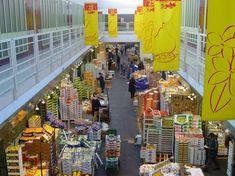
Last week's Journal reported on the EurepGAP conference in Madrid. The need to optimise food safety and traceability dominates the world of food retailers. It has never been such a burning issue for the wholesale sector, but increasingly it is becoming so and the world of food wholesaling will come together next month to address the problems this creates and the benefits of finding adequate solutions.
The quality and safety of fruit and vegetabl;es sold by wholesale markets around the globe will be high on the agenda at the 23rd congress of the World Union of Wholesale Markets (WUWM) in Portugal.
The Lisbon congress, from October 5-8, will address the concern that while scientists believe food has never been safer, consumers are being heavily influenced by media reports implying areas of concern exist in all areas of the food chain.
Independent of the question of who is right or who is wrong, it is clear that all participants in the food chain need to take responsibility for ensuring they actively respond the food security issues. Reducing consumer health risks is more than a matter of complying with regulations and quality control.
It also requires a common-sense approach, says Dr J Oostrehaven of the agro-technological research institute in the Netherlands. He will outline information to conference delegates on the proper application of food hygiene processes and systems, and the need to incorporate various other vial food security elements such as regular staff training, transparency and effective organisational culture.
The incorporation of new technologies and organisational methods can pose challenges to the food chain and to wholesale food markets in particular. Researcher Raul Green of Onra-Loria in Paris will tell delegates of the requirements for achieving market quality and traceability, whilst affording markets with improved information systems and creating trans-European institutional relationships designed to achieve standardisation of information and co-operation.



